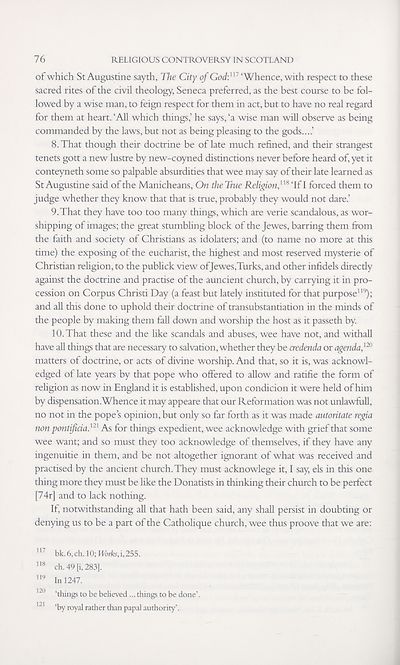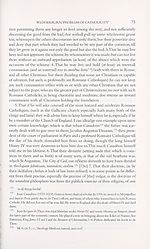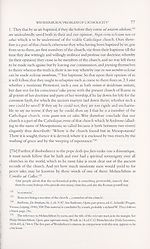Series 5 > Religious Controversy in Scotland 1625-1639
(91) Page 76
Download files
Complete book:
Individual page:
Thumbnail gallery: Grid view | List view

76
RELIGIOUS CONTROVERSY IN SCOTLAND
of which St Augustine sayth, The City of God:117 ‘Whence, with respect to these
sacred rites of the civil theology, Seneca preferred, as the best course to be fol¬
lowed by a wise man, to feign respect for them in act, but to have no real regard
for them at heart. ‘All which things,’ he says, ‘a wise man will observe as being
commanded by the laws, but not as being pleasing to the gods....’
8. That though their doctrine be of late much refined, and their strangest
tenets gott a new lustre by new-coyned distinctions never before heard of, yet it
conteyneth some so palpable absurdities that wee may say of their late learned as
St Augustine said of the Manicheans, On theTrue Religion,UH‘\{l forced them to
judge whether they know that that is true, probably they would not dare.’
9. That they have too too many things, which are verie scandalous, as wor¬
shipping of images; the great stumbling block of the Jewes, barring them from
the faith and society of Christians as idolaters; and (to name no more at this
time) the exposing of the eucharist, the highest and most reserved mysterie of
Christian religion, to the publick view of Jewes,Turks, and other infidels direcdy
against the doctrine and practise of the auncient church, by carrying it in pro¬
cession on Corpus Christi Day (a feast but lately instituted for that purpose119);
and all this done to uphold their doctrine of transubstantiation in the minds of
the people by making them fall down and worship the host as it passeth by.
10. That these and the like scandals and abuses, wee have not, and withall
have all things that are necessary to salvation, whether they be credenda or agenda,120
matters of doctrine, or acts of divine worship. And that, so it is, was acknowl¬
edged of late years by that pope who offered to allow and ratifie the form of
religion as now in England it is established, upon condicion it were held of him
by dispensation.Whence it may appeare that our Reformation was not unlawful!,
no not in the pope’s opinion, but only so far forth as it was made autoritate regia
non pontificia.121 As for things expedient, wee acknowledge with grief that some
wee want; and so must they too acknowledge of themselves, if they have any
ingenuitie in them, and be not altogether ignorant of what was received and
practised by the ancient church. They must acknowlege it, I say, els in this one
thing more they must be like the Donatists in thinking their church to be perfect
[74r] and to lack nothing.
If, notwithstanding all that hath been said, any shall persist in doubting or
denying us to be a part of the Catholique church, wee thus proove that we are:
117 bk.6,ch. 10; Works,i,255.
118 ch. 49 [i, 283].
119 In 1247.
120 ‘things to be believed... things to be done’.
121 ‘by royal rather than papal authority’.
RELIGIOUS CONTROVERSY IN SCOTLAND
of which St Augustine sayth, The City of God:117 ‘Whence, with respect to these
sacred rites of the civil theology, Seneca preferred, as the best course to be fol¬
lowed by a wise man, to feign respect for them in act, but to have no real regard
for them at heart. ‘All which things,’ he says, ‘a wise man will observe as being
commanded by the laws, but not as being pleasing to the gods....’
8. That though their doctrine be of late much refined, and their strangest
tenets gott a new lustre by new-coyned distinctions never before heard of, yet it
conteyneth some so palpable absurdities that wee may say of their late learned as
St Augustine said of the Manicheans, On theTrue Religion,UH‘\{l forced them to
judge whether they know that that is true, probably they would not dare.’
9. That they have too too many things, which are verie scandalous, as wor¬
shipping of images; the great stumbling block of the Jewes, barring them from
the faith and society of Christians as idolaters; and (to name no more at this
time) the exposing of the eucharist, the highest and most reserved mysterie of
Christian religion, to the publick view of Jewes,Turks, and other infidels direcdy
against the doctrine and practise of the auncient church, by carrying it in pro¬
cession on Corpus Christi Day (a feast but lately instituted for that purpose119);
and all this done to uphold their doctrine of transubstantiation in the minds of
the people by making them fall down and worship the host as it passeth by.
10. That these and the like scandals and abuses, wee have not, and withall
have all things that are necessary to salvation, whether they be credenda or agenda,120
matters of doctrine, or acts of divine worship. And that, so it is, was acknowl¬
edged of late years by that pope who offered to allow and ratifie the form of
religion as now in England it is established, upon condicion it were held of him
by dispensation.Whence it may appeare that our Reformation was not unlawful!,
no not in the pope’s opinion, but only so far forth as it was made autoritate regia
non pontificia.121 As for things expedient, wee acknowledge with grief that some
wee want; and so must they too acknowledge of themselves, if they have any
ingenuitie in them, and be not altogether ignorant of what was received and
practised by the ancient church. They must acknowlege it, I say, els in this one
thing more they must be like the Donatists in thinking their church to be perfect
[74r] and to lack nothing.
If, notwithstanding all that hath been said, any shall persist in doubting or
denying us to be a part of the Catholique church, wee thus proove that we are:
117 bk.6,ch. 10; Works,i,255.
118 ch. 49 [i, 283].
119 In 1247.
120 ‘things to be believed... things to be done’.
121 ‘by royal rather than papal authority’.
Set display mode to:
![]() Universal Viewer |
Universal Viewer | ![]() Mirador |
Large image | Transcription
Mirador |
Large image | Transcription
Images and transcriptions on this page, including medium image downloads, may be used under the Creative Commons Attribution 4.0 International Licence unless otherwise stated. ![]()
| Scottish History Society volumes > Series 5 > Religious Controversy in Scotland 1625-1639 > (91) Page 76 |
|---|
| Permanent URL | https://digital.nls.uk/127329057 |
|---|
| Description | Over 180 volumes, published by the Scottish History Society, containing original sources on Scotland's history and people. With a wide range of subjects, the books collectively cover all periods from the 12th to 20th centuries, and reflect changing trends in Scottish history. Sources are accompanied by scholarly interpretation, references and bibliographies. Volumes are usually published annually, and more digitised volumes will be added as they become available. |
|---|


